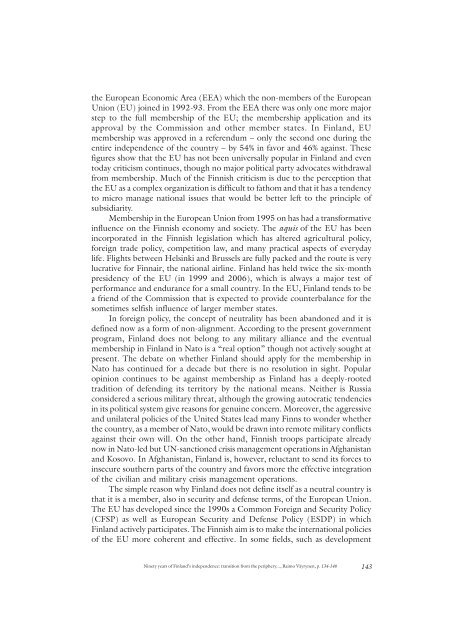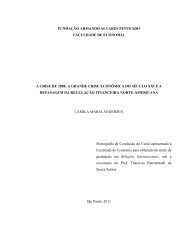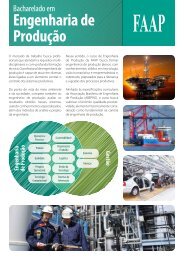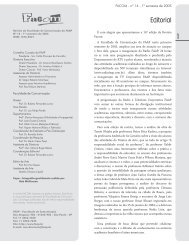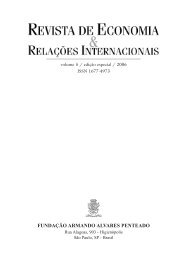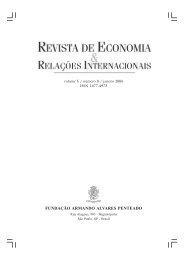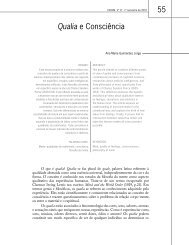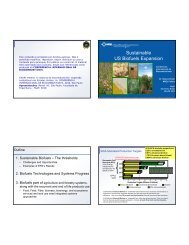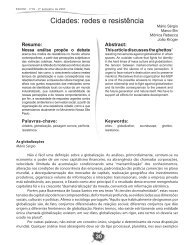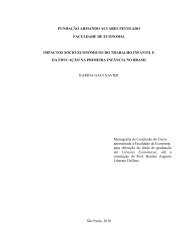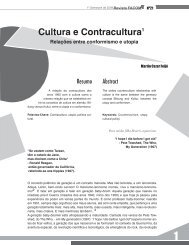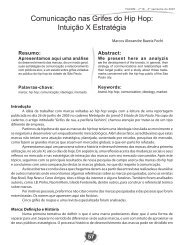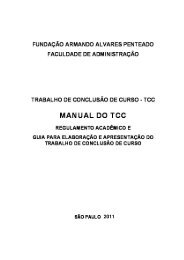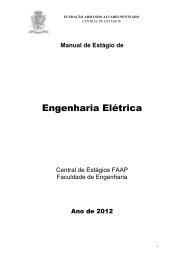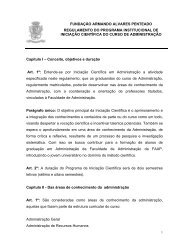Revista Economia n. 13.pmd - Faap
Revista Economia n. 13.pmd - Faap
Revista Economia n. 13.pmd - Faap
Create successful ePaper yourself
Turn your PDF publications into a flip-book with our unique Google optimized e-Paper software.
the European Economic Area (EEA) which the non-members of the European<br />
Union (EU) joined in 1992-93. From the EEA there was only one more major<br />
step to the full membership of the EU; the membership application and its<br />
approval by the Commission and other member states. In Finland, EU<br />
membership was approved in a referendum – only the second one during the<br />
entire independence of the country – by 54% in favor and 46% against. These<br />
figures show that the EU has not been universally popular in Finland and even<br />
today criticism continues, though no major political party advocates withdrawal<br />
from membership. Much of the Finnish criticism is due to the perception that<br />
the EU as a complex organization is difficult to fathom and that it has a tendency<br />
to micro manage national issues that would be better left to the principle of<br />
subsidiarity.<br />
Membership in the European Union from 1995 on has had a transformative<br />
influence on the Finnish economy and society. The aquis of the EU has been<br />
incorporated in the Finnish legislation which has altered agricultural policy,<br />
foreign trade policy, competition law, and many practical aspects of everyday<br />
life. Flights between Helsinki and Brussels are fully packed and the route is very<br />
lucrative for Finnair, the national airline. Finland has held twice the six-month<br />
presidency of the EU (in 1999 and 2006), which is always a major test of<br />
performance and endurance for a small country. In the EU, Finland tends to be<br />
a friend of the Commission that is expected to provide counterbalance for the<br />
sometimes selfish influence of larger member states.<br />
In foreign policy, the concept of neutrality has been abandoned and it is<br />
defined now as a form of non-alignment. According to the present government<br />
program, Finland does not belong to any military alliance and the eventual<br />
membership in Finland in Nato is a “real option” though not actively sought at<br />
present. The debate on whether Finland should apply for the membership in<br />
Nato has continued for a decade but there is no resolution in sight. Popular<br />
opinion continues to be against membership as Finland has a deeply-rooted<br />
tradition of defending its territory by the national means. Neither is Russia<br />
considered a serious military threat, although the growing autocratic tendencies<br />
in its political system give reasons for genuine concern. Moreover, the aggressive<br />
and unilateral policies of the United States lead many Finns to wonder whether<br />
the country, as a member of Nato, would be drawn into remote military conflicts<br />
against their own will. On the other hand, Finnish troops participate already<br />
now in Nato-led but UN-sanctioned crisis management operations in Afghanistan<br />
and Kosovo. In Afghanistan, Finland is, however, reluctant to send its forces to<br />
insecure southern parts of the country and favors more the effective integration<br />
of the civilian and military crisis management operations.<br />
The simple reason why Finland does not define itself as a neutral country is<br />
that it is a member, also in security and defense terms, of the European Union.<br />
The EU has developed since the 1990s a Common Foreign and Security Policy<br />
(CFSP) as well as European Security and Defense Policy (ESDP) in which<br />
Finland actively participates. The Finnish aim is to make the international policies<br />
of the EU more coherent and effective. In some fields, such as development<br />
Ninety years of Finland’s independence: transition from the periphery..., Raimo Väyrynen, p. 134-146<br />
143


